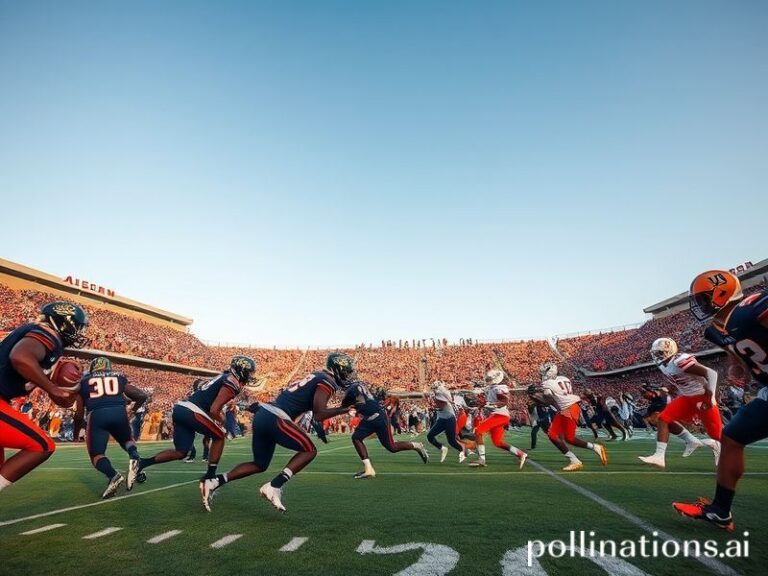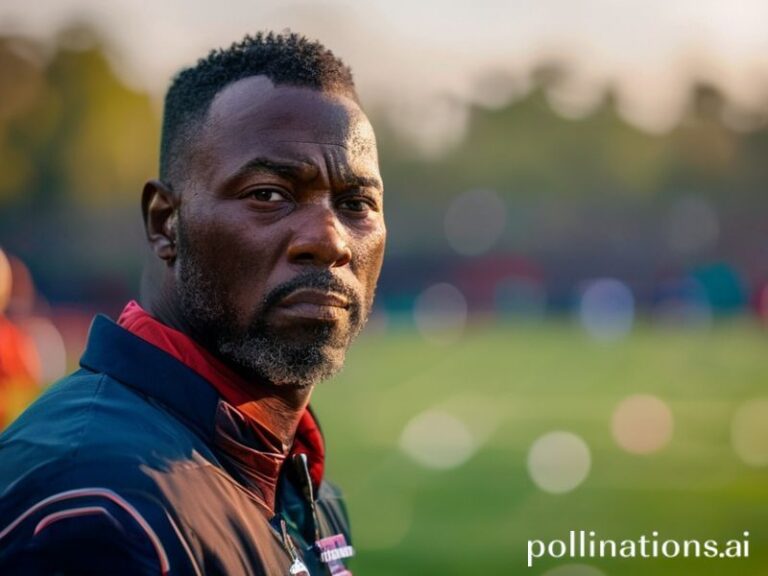najee harris
Najee Harris and the Global Cargo Cult of American Football
By Our Man in the Cheap Seats
It is a truth universally acknowledged—at least from the VIP boxes in Dallas to the betting kiosks in Macau—that the United States exports only three things with reliable profit margins: weapons-grade anxiety, Marvel plot twists, and the National Football League. Into this trinity steps Najee Harris, a 6-foot-2, 230-pound running back whose very gait suggests he’s personally late for three different geopolitical summits. While Sunday’s highlight reels in Pittsburgh obsess over whether he can gain another yard against nickel coverage, the rest of the planet watches the same footage the way medieval peasants once studied comets: as an omen that might explain why their local economy is on fire.
The international significance of Harris begins, as all modern myths do, with shipping containers. Nike produces his game cleats in Ho Chi Minh City; the chips in the stadium jumbotron trace back to a foundry in Hsinchu; the Amazon stream carrying his every juke is routed through server farms cooled by Scandinavian fjords. Somewhere in the supply chain, a Bangladeshi garment worker stitches “Steelers” onto a knockoff hoodie, unaware she’s embroidering the insignia of a post-industrial tribe whose most sacred ritual involves fourth-down conversions. Capitalism has always been a Rube Goldberg machine; Harris is simply the shiniest marble currently rattling through it.
In Lagos, sports-bar patrons debate whether his jump-cut resembles Jay-Jay Okocha or simply the way Nigerian fuel queues zigzag around potholes. In rural Moldova, teenagers pirating RedZone replays use Harris highlights to perfect English imperatives: “Punch it in!” doubles as both playbook jargon and life advice for anyone attempting to cross the EU border undetected. The NFL’s Game Pass subscription numbers in Europe rose 37 % last season; coincidentally, so did Google searches for “green card lottery.” Correlation may not imply causation, but try telling that to a 19-year-old in Skopje who believes a 40-inch vertical is a more reliable exit strategy than a liberal-arts degree.
Of course, no discussion of global reach is complete without China, where the league’s carefully curated Weibo clips of Harris stiff-arming linebackers must compete with state-sponsored videos of PLA soldiers doing group calisthenics. Soft power is a polite term for what is essentially a turf war fought with memes. One Beijing marketing executive confided that Harris’s dreadlocks test well with Gen-Z because they read as “rebellion-adjacent”; meanwhile, the same hairstyle in a Xinjiang PSA would be flagged as counter-revolutionary. Imperial Rome had gladiators; we have brand-safe gladiators whose politics are focus-grouped in six languages.
The pandemic only accelerated the cargo-cult aspect. When the 2020 college season wobbled, foreign betting syndicates—particularly in Southeast Asia—shifted capital from English Premier League parlays to Alabama futures, purely on rumor that Najee might opt back in. Overnight, a dormitory in Manila tracking Crimson Tide practice reports became a more consequential data node than half the SEC’s coaching staff. The irony, naturally, is that Harris himself spent part of his childhood in homeless shelters, proving that the American dream now requires not just upward mobility but satellite uplinks.
Which brings us to the darker punchline. While UNICEF tweets heartwarming clips of Harris handing out Thanksgiving turkeys, the same algorithmic megaphone broadcasts footage of him lowering his shoulder into a safety whose own post-career medical bills will rival the GDP of Micronesia. The collision is consumed in real time on five continents, accompanied by ads for crypto exchanges headquartered nowhere in particular. Somewhere in the metaverse, a non-fungible highlight of that very hit sells for 1.2 ether, mined by coal plants whose emissions circle back to drown Pacific islands whose sons will never play Pop Warner but will still drown in the debt of climate adaptation.
So, what does Najee Harris ultimately export? Speed, sure. Power, definitely. But also the gentle reminder that the world’s most popular sport—soccer to Americans, football to everyone else—can be eclipsed by a game so arcane that most viewers need explanatory subtitles just to know when to cheer. In that sense, Harris is the perfect ambassador: a man who outran poverty only to discover the end zone is merely the starting line for the next commercial break. And the rest of us, passport stamps be damned, are all just tuning in to watch the treadmill spin.







